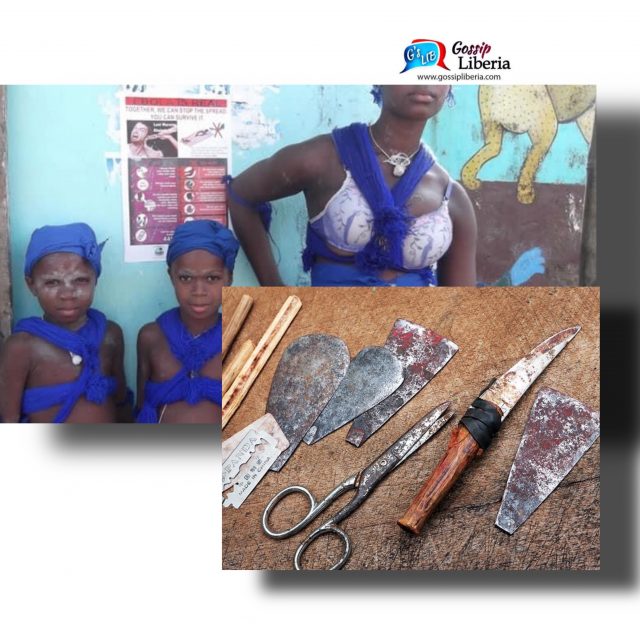By: Titus B. Pakalah.
Female Genital Mutilation (FGM) is one of the oldest traditional practices in Africa’s period-long sovereignty, Liberia. It is an old-fashion practice that is imposed against women and girls mostly in rural settlements with no formal idea about its consequences. This involves the ‘trimming’ of external genital organs for no health benefit. These circumcisions are meant to control women’s sexuality before marriage. As a child growing up in a little town in Salayea, when a festive season is nearing, women, girls and minors were given to traditional elders (women) by their parents to cut their genital organs, but the pretense tells us: those girls were traveling for vacation to learn early parenthood and how to become successful in life. No.
This was otherwise — in fact, our girls and women who were turned over were taken into a deep forest where people rarely tour. As part of popular customary norms, when a child or girl is mutilated, her name definitely changes. If Mary was sent to the sande (zadεgi) society to undergo FGM and comes back(sometimes with circumcision garment), she is either called ‘Lorpu’ or ‘Garmeh, the names have deep meanings amongst girls in the “cult world” and can be interpreted only by those who have encountered this practice. Sometimes victims of this circumstance are given supernatural powers to perform magic while among the innocent — do not go for it; it is the smartest way to encourage other girls and boys to be recruited.
The story of Zaye Doe who died as result of force female genital mutilation in 2017 sends out an urgent need for public governance to address this practice. Although on January 19, 2018 ex-president Ellen Johnson Sirleaf signed an executive order 92 temporarily banning FGM for one year, which eventually ended on January 19, 2019, no law in Liberia prohibits FGM and it is hugely backed by countless public officials. When ex-soccer player, Amb. George M. Weah came to the presidency with prominence he considered himself as feminist-in-chief, publically defended women rights, he promised to end RAPE and create women political participation within his administration, but this seems as a political gimmick. In fact, there is no tour de force to celebrate against FGM under his administration.
Moreover, under the watch of the feminist-in-chief, the Domestic Violence Bill was scrapped, removing section that prohibits FGM in 2019. We cannot overly hold him accountable. Here is why: when this Bill was sent to the House of Senate where the Vice-President, Madam Jewel H. Taylor serves as President of the Liberian Senate — she contested the approval given that FGM was part of the Domestic Violence Bill in 2019. Vice-President Taylor could have been at the apex of saving millions of girls’ lives from the unprecedented scale of FGM but she eventually kept silent in the misfortunes of many Liberian children and women who are still being cut every day. It was until July 24, 2019 when madam Jewel Howard Taylor said FGM should be treated as separate law.
No, the Vice-President among many public officials knew the ideal scenario but twisted the conversation by signing the Domestic Violence Bill into law (without section on FGM) and publically informed her audience that she needed to consult traditional leaders on the eradication of FGM. This is utterly unbelievable. Did you know that the Domestic Violence Bill was introduced since 2014? Was there insufficient gender framework that could not integrate traditional leaders to examine the Liberian situational analysis about FGM and address the prevalence?
Millions of foreign aids were pumped into the country to combat FGM, Rape and improve gender parity, many donors organizations were the Swedish Embassy, ActionAid, USAID and Plan International. Those millions are still unaccounted for as tradition continue to tear our sisters and ruin their dreams. How could a constitutional democracy risk the lives of millions of girls and women when it is supposed to guarantee the protection of fundamental and inherent rights?
Public governance and Legal framework:
Liberia has less technical approach against FGM. From institutional weakness to extralegal criminal justice system; it continues to lag behind major international consensus and existing laws signed to promote the well-being of all citizens. Whether it is the legislature, the executive or judiciary, there should be effective governance that is willing to complement and exert laws against the practice of FGM and all forms of repressive rights abuses women face in private or public areas. The essence of governance is ensuring that its citizens’ rights are equally protected within the framework of legal proceedings. Sometimes laws are a deterrent to fear social behaviors and traditional norms that tend to promote misogynist violence and reverse communities’ action.
Although rape is the second most reported crime in Liberia with major interventions, FGM has been ignored by the emergence of political institutions from the darkest promises and party manifestos. If one should speak about public governance, then people who intend to fill the gap of public leadership should also be held accountable for ignoring the facts that women and girls in Liberia face the worse shadow pandemic in their life time. Despite policies on trade regulations, public school, religious centers, corruption and citizenship, political governance has failed to acknowledge that there is widespread of this act that needs to be addressed with urgency.
If the logic of kicking FGM out of Liberia is solid — we must now begin to accelerate community conversation and streamline the best policies. This comes with youth participation and engagement, and gender- social inclusion. Ensuring the best visible actions against FGM, women should also be willing to lead a specialized task force that will contest the prevalence, because they are the direct victims and survivors of the consequences, public governance should admit to support women groups, CSOs, NGOs and various youth groups.
Intensifying communities’ effort to end FGM in Liberia will require us to improve international consensus that Liberia has ascribed to and create interest group which among others will lead a major call to action to promoting zero tolerance on FGM and all forms of violence women and girls face. The ministry of gender and all necessary ministries and agencies should increase support services exclusively for victims and survivors of FGM. These support services and interest groups could then function in separate ways, one shelters victims and the other provides basic understanding on the practice in various public spaces. But the law should represent its self entirely.
Situational Analysis:
“The prevalence of FGM in women aged 15 — 49 is 38.2% . 83.3% of women aged 15 — 49 are aware of FGM as a practice. 38.2% of women aged 15 — 49 have undergone FGM. The practice is considerably more prevalent among women who live in rural areas (52.3%) than those in urban areas (29.9%), and most prevalent in the North Western (68.3%) and North Central (54.2%) regions. The lowest prevalence of FGM is in the far south-east (2.9%).
FGM is more prevalent among Muslim women (58.6%) than Christian women (34.7%) and is less prevalent in women in higher wealth quintiles than those in the lower quintiles.”
“The prevalence of FGM in women aged 15 — 49 (38.2%) cannot be directly compared with data from previous years, which used membership of Sande societies as a proxy for FGM. In any case, due to the large age-range of women included in DHS surveys, changes in the overall FGM prevalence in a country over time may not fully illustrate the progress that has been made.
Breaking down the most recent data by age group suggests that the practice is in decline. In women aged 45 — 49, 59.7% of women have experienced FGM, while in women aged 15 — 19 this figure is 27.6%. Despite the fact that a small number of women may be cut after the age of 15, the data suggests a trend towards lower prevalence in younger women.”
The above statistics belongs to: 28toomany
About the Author:
Titus B. Pakalah is a Liberian Human Rights Campaigner, Student of the United Methodist University, Executive Director, March For Justice.
Centre For Human Rights Studies( South Africa) fellow!












